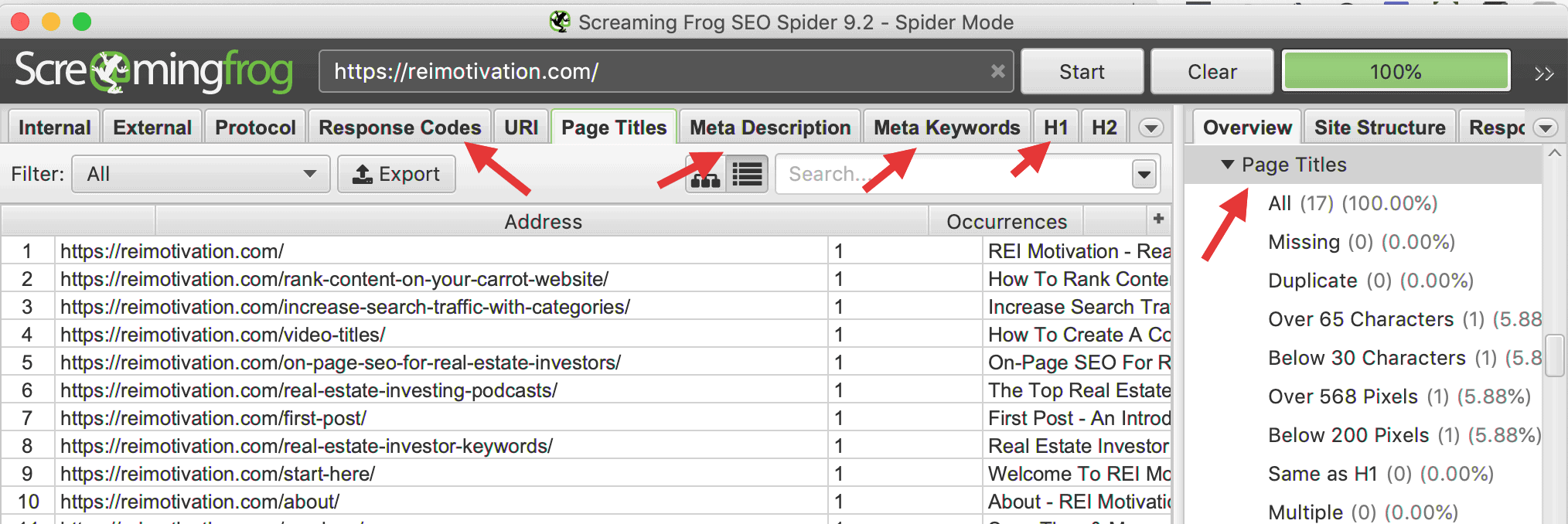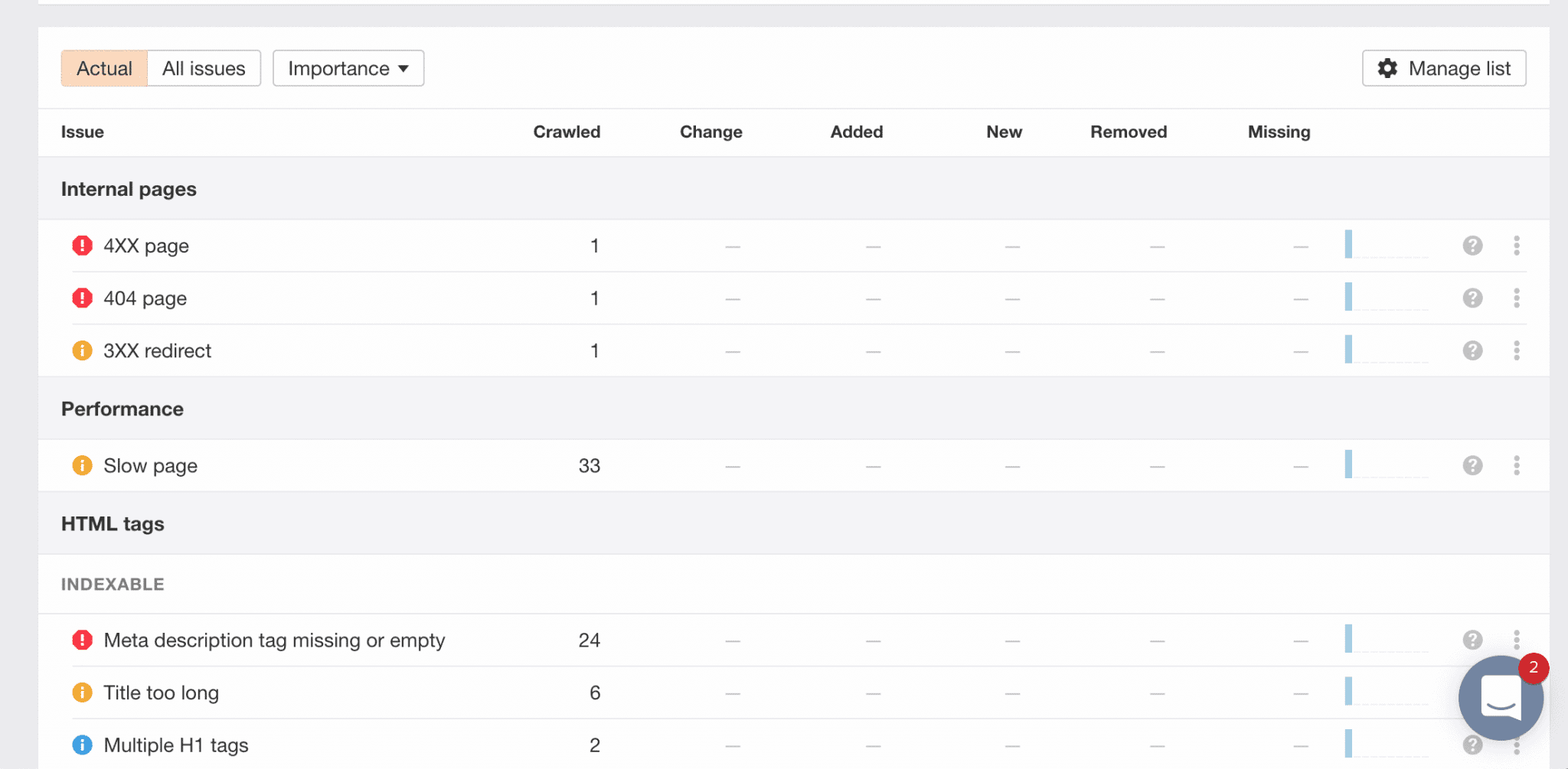In this post, I am going to make a case that every real estate investor should perform a biannual SEO audit on their website.
If there is one thing I know about SEO, it’s that the work truly never stops. There will always be optimizations you can make to your website.
Digital marketing can be fast-paced. You are constantly creating content, driving traffic, and might have old content and errors hanging around from who knows when.
It’s a good idea to slow down every so often and fix your website’s foundational SEO to make sure you are able to scale the website into the future.
SEO Errors – What Are They?
There are a lot of little nuances to real estate search engine optimization. It’s not uncommon for little things to be overlooked when you are marketing your website.
One of the most common examples of an SEO error is a 404. When you create a landing page and delete it 2 months later…there is a good chance that Google was aware of that page. Or maybe you used it on a social media post. If someone comes across that link it will go to a “Page Not Found” on your website.
This is a bad user experience and will likely cause the user to bounce from your website and move on.
Google takes note of the amount of 404s and the frequency someone leaves your website on the first pageview (also known as bounce rate).
The funny thing is, fixing a 404 takes a couple of seconds and can help your SEO.
So why don’t most real estate investor do anything about it? Because they aren’t conducting SEO audits.
Another common error is missing alt text on images or meta-information (titles, descriptions, etc.) on their pages and blog posts. These are little factors that add up over time.
Low Hanging Fruit
If you fix all of the errors or warnings on an SEO audit you won’t see a HUGE increase in your SEO rankings. That’s not how it works.
Unless heaven forbid, your site was blocking the Google bots from even crawling your site (I have seen it happen)
Most of the time these little errors are low hanging fruit and aren’t make or break. But they should still be fixed.
I am a big believer in doing whatever I can to get a 1% increase in effectiveness or productivity. If having SEO errors are recognized by Google’s algorithm, I want to make sure my site isn’t penalized. Fixing these little things gives me the BEST possible chance to rank within my control.
Down Time
If you are like me you can get a little burnt out on SEO. Driving backlinks, optimizing on-page SEO, writing content, etc.
If you want some mindless work and want to ensure you have the STRONGEST possible foundation, consider an SEO audit.
Most of the time (unless your site is really jacked up) you can fix all SEO audit warnings and errors in a day or less.
Opportunity Cost
Don’t go crazy trying to fix 100% of the SEO errors you might uncover during an SEO audit.
There will be certain warnings or errors that flat out don’t matter. For instance, you might have an error telling you have duplicate page titles on multiple pages. After further investigation, you will see that they are the titles of your blog post pages. If your blog has 100+ posts and 10 posts per page, you will have 10 pages with the same title.
Don’t worry about it.
That is super common on websites and Google knows it.
Focus your time and energy on errors like 404s, missing meta information, duplicate content, missing H1s, etc.
How To Perform An SEO Audit
You have multiple options for preparing an SEO audit. There are tools that range from free to $297/mo.
Obviously the more you pay the more comprehensive the tool. Depending on the complexity of your website you might be able to use a free tool.
If you have less than 20 pages on your website the free route is best.
If you have 100+ pages and close multiple deals per month…you better invest in some decent SEO software. One lost deal a month could be slipping through the cracks of a website with SEO errors.
I will list some of my favorite tools below.
Hire REI Motivation For An SEO Audit
Get A Personalized SEO Audit + FREE Strategy Session
1. Google Search Console – Free
I believe every website should be claimed with Google Search Console. It’s a good idea to do it right after you launch your site so Google is aware of your new website.
The only SEO audit information you are going to get out of Search Console is
- Can Google crawl your site
- What 404s you have
This option is best if you know your on-page SEO is tight and you are on a budget.

2. Screaming Frog – Free
By far, this is the most powerful free tool I know of to perform an SEO audit.
You download the tool to your computer and give it your URL. It will then crawl your entire site and give you more information than you will know what to do within a spreadsheet.
It will tell you things like
- Page title
- Meta description
- Common words on the page
- Duplicate content
- Long page titles
- If the page is a 404
- Time to load the page
- And tons more
The problem is…unless you are familiar with SEO audits you won’t know what to fix first or what to do next. This tool is great for SEOs but not the best if you are just learning.

3. Agency Analytics – $49+/mo
Agency Analytics is one of my favorite SEO tools period. They have come a long way and have a really awesome dashboard for SEO and PPC.
If you are a legit real estate investor they have everything you need to track all your marketing (email, call tracking, PPC, SEO, audits, etc.).
Agency Analytics does what the other tools above do but they give you a handy report and tell you which errors are legit errors, which are warnings, and what your website passes.
You can send the report to someone on your team or hire someone one to help you fix them.
The best part?
You can set up monthly crawls of your website and have the SEO audit report emailed to you or a team member.
Here is an example of what you get.

You can click into each of these panels to see exactly which page the error or warning is occurring one. This removes the guesswork and you can immediately hop in and fix it (or not).

4. Ahrefs – $99/mo
Ahref’s is one of the leaders in software for professional SEOs. Unless you plan on doing some heavy lifting with your SEO you probably don’t need the $99/mo membership and it would be better suited uping your Carrot membership or joining Agency Analytics.
With that being said, Ahref’s did launch a Site Audit tool not long ago.
It’s comprehensive and crawls your entire site like some of the other tools on this page.
You can check out the results of a crawl below.

I Performed An SEO Audit – Now What?
If you decided to take my advice and use one of these tools you might be thinking now what do I do.
Like I mentioned earlier, not all errors need to be fixed. If you have specific comments or questions about the errors you are facing leave them in a comment below.
I am going to try and do my best to tell you which errors/warnings I would try and fix on an SEO audit.
- 404s – Google looks at these so redirect all 404s to existing content with a 301 redirect.
- Broken external links – sometimes you will link out to other websites and they will change their URL, you will want to update these URLs as you see fit.
- Pages with HTML errors – this is slightly technical but some pages might not tell Google what it is and cause confusion. Fix these as necessary.
- Missing meta descriptions – if you don’t write one, Google will grab the first bit of content it finds on your site. This may or may not help you
- Duplicate content – fix this as you see fit. If you have a bunch of duplicate content Google might ding your website
- Missing page titles – You will want to fix this as Google looks at this to get context about the page
- Missing H1s or duplicate H1s – this is so easy to fix and should be done
- Missing sitemap – if Google can’t find your sitemap it’s probably guessing at what content is on your website.
- Image alt text – don’t stuff these with keywords but give Google context to what the image is. It can also help people with visual impairments who use screen readers.
- Slow page speed – if there is a page with large images, consider optimizing the images or scripts that are slowing it down.
There are more errors but these are the most common ones I have encountered with performing SEO audits.
Measure Your Results
Again, you likely won’t see a HUGE increase in your rankings. Nevertheless, pruning your SEO garden is worthwhile and ensures you aren’t allowing any big errors to creep in and hurt your performance.
If you spend countless hours working on your content, driving traffic, getting backlinks, and other SEO activities then you owe it to yourself to make sure you aren’t harming your site by moving fast and forgetting the small details.